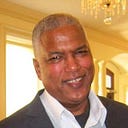Member-only story
My Discussion with a Long-Time Black Republican
I Didn’t Get the Answers I Expected

The above photo is of former Maryland Lt. Governor Boyd Rutherford, a Black Republican, but not the one I recently spoke with. I’d been searching for a Black Republican to engage with since 2012, which I wrote about in 2017.
In Search Of The Elusive Black Conservatives — ENIGMA IN BLACK
I thought I’d found someone about a year ago, but he backed out for unknown reasons. He ghosted me.
I should have been looking closer to home. I'd lost touch with a former co-worker from my days in corporate America who I knew to be a staunch Republican. A mutual friend put us back in touch, and we talked on a number of subjects, including what it was like to be a Black Republican. He wasn’t your average Black Republican because he’d served in the administrations of three Republican presidents: Ronald Reagan, George H. W. Bush, and the first Trump administration.
One of my first questions was, “How did you become a Republican?” His answer was the first of many that defied my expectations. I expected to hear that he was raised in a Republican family and became a Republican because of family history, which is how most Black Democrats became Democrats. He indicated that he’d become a Republican in 1975 after undergoing a carefully thought-out decision-making process. He’s attended a meeting of the bipartisan Council of 100 (mostly Republican) and decided to cast his lot with Republicans. He also felt it would be harder to make a difference as a young Black Democrat, of which there were many.
Ironically, he ended up being part of a Republican family, with his father becoming a Republican in his later years and his mother working for Republicans. Among his influences were books by Black economist Thomas Sewell and a general feeling that Black people shouldn’t be too dependent on government. Our discussion wasn’t like the back-and-forth shouting matches on cable news stations. Each person could complete his thoughts, and we likely agreed on more than we disagreed.
My friend expressed that having Black representation in both major political parties should be a good thing. He acknowledged that he was “catching hell” from other family members and told our…

